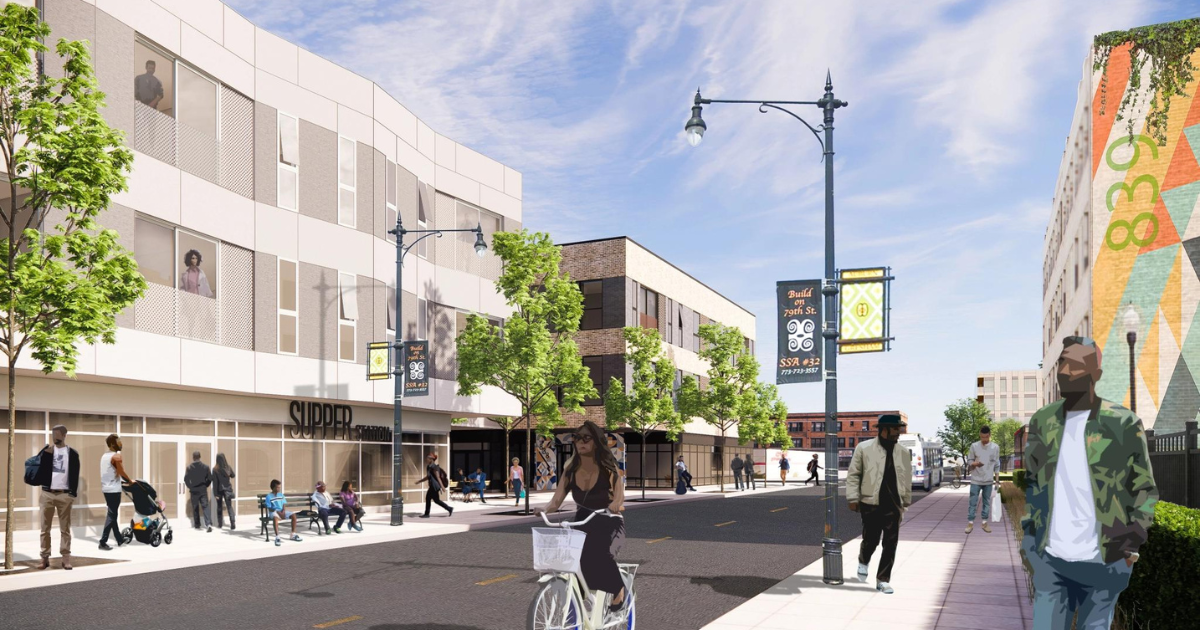THE AUBURN GRESHAM Apartments (838 W. 79th St.) shown in the rendering above, was the first INVEST South/West project to be approved by the City Council in 2022. (Photo credit: Department of Planning and Development)
By: Torrey Barrett, Principal Imagine Development Group; Larry Huggins, CEO Riteway-Huggins Construction Services, Inc; AJ Patton, Chairman 548 Enterprise; Nosa Ehimwenman, President Bowa Construction; Jimmy Akintonde, President UJAMAA Construction; Cornelius Griggs, President GMA Construction Group; Leon Walker, Managing Partner DL3 Realty, L.P.
If you listen to certain media outlets, you might hear from skeptics that the apocalypse has hit Chicago. These naysayers bemoan the state of the market and local economy, despite plenty of data that shows both are roaring back after COVID-19 caused one of the worst economic crises of our lifetime.
While those folks claim the sky is falling, Black and Brown developers and contractors like us, who for generations have been marginalized, are seeing a whole new day.
That’s largely because of the opportunities afforded by Mayor Lightfoot’s INVEST South/West initiative, which has pushed $2.2 billion (and counting) in public and private investment commitments into 12 commercial corridors on our South and West Sides.
Those investments, in places like Auburn Gresham, Englewood, Humboldt Park and Austin are generating economic progress we never imagined.
With that progress comes new chances for people like us to do what we’ve always dreamed of in the communities we came from.
We all got into this business because we wanted to be able to improve our communities, employ people, and create new energy for small businesses.
Most of us grew up in these neighborhoods. We walked past vacant lots on our way to school. We saw the devastation and despair that stems from the economic disinvestment and neglect of the past.
For decades, minority-owned businesses like ours have been relegated to 2.6 percent or (often) less of the value of projects going through Chicago’s Community Development Commission. Further, projects involving City assistance require minority-owned business participation in the construction, but not in the ownership. But over the past four years, we’ve started to see a different reality. Mayor Lightfoot is the first mayor to prioritize ownership and material participation in the visioning, financing, construction, and long-term management of community assets supported by the City. This is a stark departure from the past, and Mayor Lightfoot has initiated this change, which is now part of the DNA of City Hall.
The ripple effects of this moment, especially coming out of the pandemic-related economic crisis, can change the destinies of people on the same blocks we grew up on. We can imagine those vacant lots cleaned up and filled with restaurants, clothing shops, health clinics, grocery stores and bookstores – each brimming with customers as well as workers who can then spend their hard earned wages in their own neighborhoods.
For the first time, that vision isn’t just a daydream.
INVEST South/West is also highlighting the degree to which the struggles of Black and Latino developers and contractors– and our communities as a whole – are bound up together. While the established developers who traditionally controlled the local market have largely ignored our neighborhoods, we now have the chance to work in unity. Now more than ever, that sense of solidarity and interconnectedness is crucial.
It’s important to give credit where it’s due. It has taken leadership from Mayor Lightfoot and her team at the Department of Planning and Development to make this happen. We remember past years of the “tale of two cities” narrative animating mayoral election after mayoral election, as candidates and activists worked to call attention to the past disproportionate focus on investment in white areas and downtown. Black and Latino developers and contractors like us urged previous administrations to create an opportunity like the one we’re experiencing with INVEST South/West. But our talent continued to be overlooked in the commercial real estate industry. Building a talent pipeline is essential for more diverse participation in this industry, and Mayor Lightfoot is seeing it through.
To truly take on violent crime and poverty, we all know what it’s going to take. Plenty of folks talk about the need to invest in communities, create jobs, support local small businesses and raise wages to depress crime. Mayor Lightfoot and her team have stood up, challenged the status quo, and done the work to make things happen – even when it hasn’t always been in their self interest – from a raw political standpoint.
We might not see some of the cascading effects of that boldness for years. But for those like us, who are finally getting the opportunities for which we have been demanding for a long time, the impact is palpable right now.






